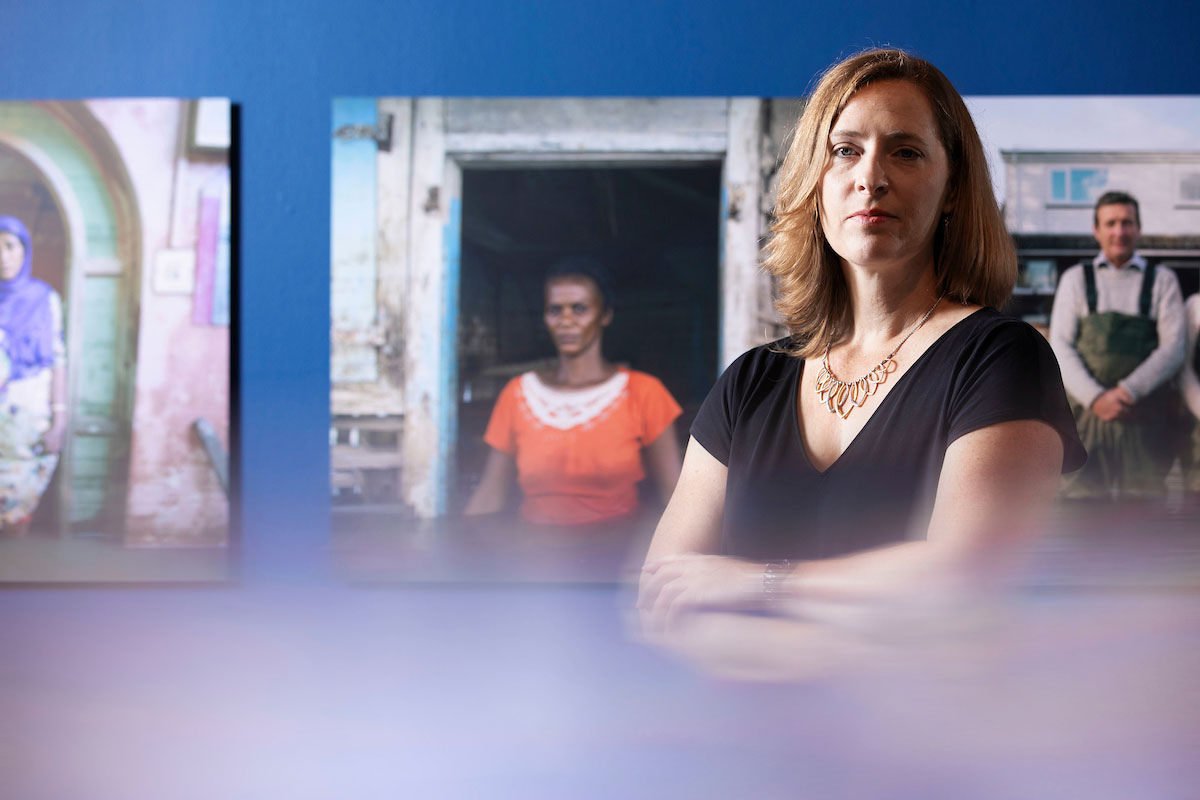“We know we’re the problem, so we also know that we can be the solution.”
 Portrait by Brianne Lehan and Lyon Duong/UF Photography. Artwork: "Adlene Pierre, Savanne Desolée, Gonaïves, Haiti, September 2008; Mushaq Ahmad Wani and Shafeeqa Mushtaq, Jawahar Nagar, Srinagar, Kashmir, India, October 2014; Jeff and Tracy Waters, Staines-upon-Thames, Surrey, UK, February 2014;" by Gideon Mendel from the series Drowning World, courtesy of the artist and Axis Gallery, New York and New Jersey
Portrait by Brianne Lehan and Lyon Duong/UF Photography. Artwork: "Adlene Pierre, Savanne Desolée, Gonaïves, Haiti, September 2008; Mushaq Ahmad Wani and Shafeeqa Mushtaq, Jawahar Nagar, Srinagar, Kashmir, India, October 2014; Jeff and Tracy Waters, Staines-upon-Thames, Surrey, UK, February 2014;" by Gideon Mendel from the series Drowning World, courtesy of the artist and Axis Gallery, New York and New Jersey
Andrea Dutton
Associate professor of geology, College of Liberal Arts and Sciences; faculty fellow at the Florida Museum of Natural History’s Thompson Institute for Earth Systems
How many geologists make repeat appearances in Rolling Stone? Drawing on her years as a schoolteacher, this rock-star climate scientist became a go-to explainer of environmental issues — and her research can help predict what happens next.
Climate CSI:
Dutton’s research looks to the ancient past for indications of what to expect as seas rise. But unlike past climate shifts, natural variations can’t explain today’s rapidly warming climate and rising seas. In op-eds, government meetings and countless media interviews, Dutton takes time to explain that greenhouse gases created by human activity are the cause — and while a handful of vocal climate-change deniers debate this, climate scientists do not. “We’re a little bit like a CSI of the Earth. We’re looking for all these clues of what has happened,” she says. “It turns out CO2 is like the dumbest criminal in the world. It leaves evidence all over the place. Everywhere we look, we can see the evidence that this is what’s been happening, which makes it easy for us and is why we don’t debate it.”
What motivates you?
“There’s a lot at stake with climate change and sea level rise. It’s going to affect our access to food, water and energy, which are the fundamental things we need to survive. The majority of people across the U.S. understand that global warming is happening, but the minority of them think that it’s going to affect them. There’s a real disconnect. That’s one of the things that motivates me — to help people connect those dots.”
How do you stay optimistic?
“There are actually a lot of positive changes happening. I’m really encouraged by how much is happening at the state level. Wind and solar have now dropped in price enough that the economic argument is straightforward. The technology’s already in place. We just need to decide to use it. And the sooner we make this change, the better the final outcome is.”
What can we do?
“Go out and talk about climate change, because so many people are afraid to even bring up the issue because it’s so polarizing and people can get so upset about it. But if we don’t talk about it, we won’t be able to adapt or to deal with it or to plan or any of those things if we’re too afraid to even talk about the issue. That is something all of us can do that can have a huge impact.” (For reliable climate information, Dutton recommends realclimate.org, skepticalscience.com or the Global Weirding video series.)
Read more about Dutton’s work in this piece from Ytori magazine.
This is part of a series highlighting people at the University of Florida working to protect our well-being and the health of the planet, paired with works from the Harn Museum of Art exhibition “The World to Come: Art in the Age of the Anthropocene.” See the full series.